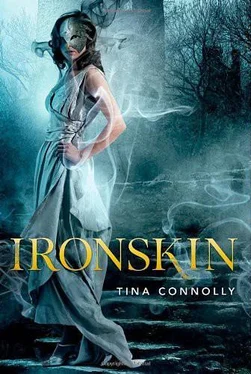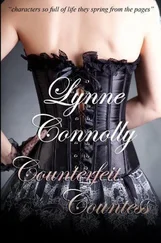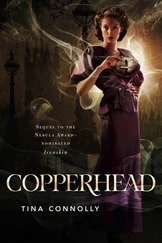“I passed two cousins and a maidservant this morning that thought something of it.”
“Is that why you’ve been so cold to me all week?” said Helen. “You barely wished me a good birthday on Tuesday, and I am now eighteen and quite ridiculously adult.”
“I have not been cold to you,” said Jane, nettled. “You’ve been busy with teas and ordering the servants to twist bows and make cakes. I’ve had errands to run. There are things I can only get in the city and not—” But she stopped short of criticizing her new home.
“Not out in the sticks,” said Helen. “I understand our real trouble this week, don’t you worry. My simply divine new life will not come between us. You absolutely must give up that dreadful job and come live with us. Alistair is quite wealthy enough to feed another mouth, and I refuse to strand my sister in the remains of the war zone.”
“A touching invitation, if melodramatic.”
“Bother your sarcasm. You know what I mean. No one would think anything of it if you left that position.” Helen untied and retied the ribbon between her breasts. “Your Mr. Rochart is well known.”
“Is that so?” said Jane. She tamped down a surge of interest in the subject and calmly tucked a manufactured curl into the pearl comb.
“There is a mysterious air around him, that’s what I know,” said Helen. “Is it true he killed his first wife? Like the fey story of Bluebeard, you know, a forbidden locked room, and when the new wife enters it she finds all the dead wives hanging on the wall, and then”—she drew a finger across her throat with gruesome relish—“ snick, she’s next.” Her eyes grew wide at her own imaginings. “Ooh, what if you’re in danger? Maybe you shouldn’t even go back to turn in your resignation. Stay here with me. They can ship your trunk.”
“His wife died in the Great War,” Jane cut in. “Fey bomb, I believe.”
“You believe. But you don’t know.”
“I’ve seen more of him than you, and I don’t believe he’s a Bluebeard for one instant,” said Jane. “If he were, he would’ve advertised for someone beautif”—a gesture with her hand cutting off the word—“someone not me. Besides, I’ve been there for a month. Surely he would’ve chopped me into bits by now.”
“Maybe he likes it to be a surprise when it happens,” said Helen thoughtfully. She cast around for more gossip. “Well, everyone knows his daughter has some sort of deficiency, so he keeps her locked up in the garret and no one ever sees her.”
“Untrue,” said Jane. “She can go nearly everywhere in the house.”
Helen pounced. “Nearly?”
“Well, not the studio, but that’s off limits to everybody. And not the western wing, but you see it’s damaged.…” Jane trailed off, annoyed by Helen’s raised eyebrows. “Well, tell me the rest of the lies.”
“Well, he had an affair with the Prime Minister’s wife, and that’s perfectly true and not lies at all, despite the fact that his cheeks are thin and he never pomades his hair. She met him at a dance last spring, and then she went down all the time to see him, and finally stayed down there for a month. And when she came back she was so refreshed and glowing, she looked ten years younger. The Prime Minister didn’t even have a clue, but everyone else was laughing and making cuckold horns behind his back. How’s that for facts?”
Jane was cold inside at the thought. “Facts?” she managed. “You haven’t produced one. There, now your hair’s done. Let’s put you in the dress.”
A knock on the door was followed by a maid backing in with a tea tray.
Helen jumped up. “It’s not time for my dress,” she said. “First there’s morning tea, and then there’s you to get dressed and brushed and curled, because like it or not, I intend for you to be stunning. Two sisters, each more ravishing than the next! Men dropping dead at their feet!” She staggered dramatically to Jane, sank to her knees, and laid her head in Jane’s lap. “Now come eat something.”
The tea was delectable—little cream-filled cakes, slices of crisp hothouse cucumbers, chocolates and sugared almonds piled in silver bowls. Helen replenished Jane’s plate faster than Jane could empty it. She cradled a warm cup of black tea and tried not to think of Mr. Rochart’s past affairs. Of course men had them. Eyeing her sister’s frothy nightclothes—of course people had them.
Helen caught Jane’s eye. “Are you still thinking about me living here? I was perfectly well chaperoned, I promise you. Everyone knows I have no family. Where was I supposed to live?”
“By yourself, in our flat,” said Jane. “I would’ve sent you money.” Most governesses lived with their families, of course. But Jane’s school had refused to let an ironskin board there with the pupils. Helen’s family had agreed to let her share a flat with her sister so Jane wouldn’t have to live alone. But they had insisted it be a nearby flat, and in that part of town it had taken both girls’ scanty salaries to barely cover the rent. Though Jane could be cross, she suspected that deep down Helen was grateful not to have to live with her charges. Helen was never the mothering type.
“In our empty flat I wouldn’t be chaperoned,” said Helen. “Positively much more scandalous, I assure you. Not to mention dull as dirt. No Jane to fuss over me and keep me from spending all my earnings on shoe buckles and fizzy wine. Why does it bother you?”
“It doesn’t,” said Jane. If she probed deeply, it was probably because she felt guilty at leaving Helen to make her own decisions, manage her own life. Which was ridiculous. She’d only left Helen because Helen was leaving her. Well, that and the no-job thing. She’d been fired from the Norwood School over winter holidays, and hadn’t that just made them pleasant. “Forget I said anything.”
Helen carefully took apart a cream cake and licked the insides out. “Can you remember when we used to have this sort of thing at home?”
“Just,” said Jane. “Never every day though.” Father had died in the Indis of brain fever when Jane was eleven. Though the estate went to Charlie, there had been no family money left, except what Father had earned by his wits. After the dust and the debts had been settled, they were left with Mother’s tiny annuity. Still, even those times had had joy in them. Jane had seen the terrible conditions at the Norwood School, and that had just been as a teacher. If both her parents had died when Jane was eleven, she and Helen might have ended up as charity pupils at a school just like that, cold and hungry and at the mercy of typhus or polio. She could scarcely imagine how that Jane would have turned out—equally scarred, perhaps, equally angry.
But when Jane was thirteen, the war started, and the poor-but-happy time grew fainter, thinner as the terror dragged on and on. Until one day on a battlefield her brother was gone and it was all over, all of it.
After the war, after no Charlie, the estate went to the cousins, and Jane could not even keep Mother in her own home while she wasted away. All she could manage was huddling in Niklas’s foundry, lost and confused and trying to recover from a wound that would never heal.
But down that road lay guilt and rage. Jane blinked back the orange fire that warmed her mask, doused it with thoughts of lakes and streams and pure cooling rain. She refused to be angry today.
“No, not cream cakes every day,” Helen was saying, “unless Father sailed home with a windfall. But better than never. Better than grubbing in the gardens, and depending on neighbors’ charity, better than watching Mother take in tatwork and ruin her eyes by hoarded candlelight. Tatwork! Do you hear how old-fashioned that sounds? No one wears lace now. Mother wouldn’t know what to make of it, if she were here.” Her voice faltered on the final word.
Читать дальше












